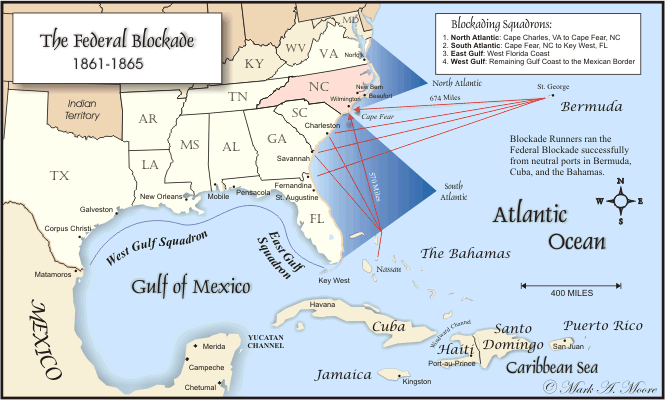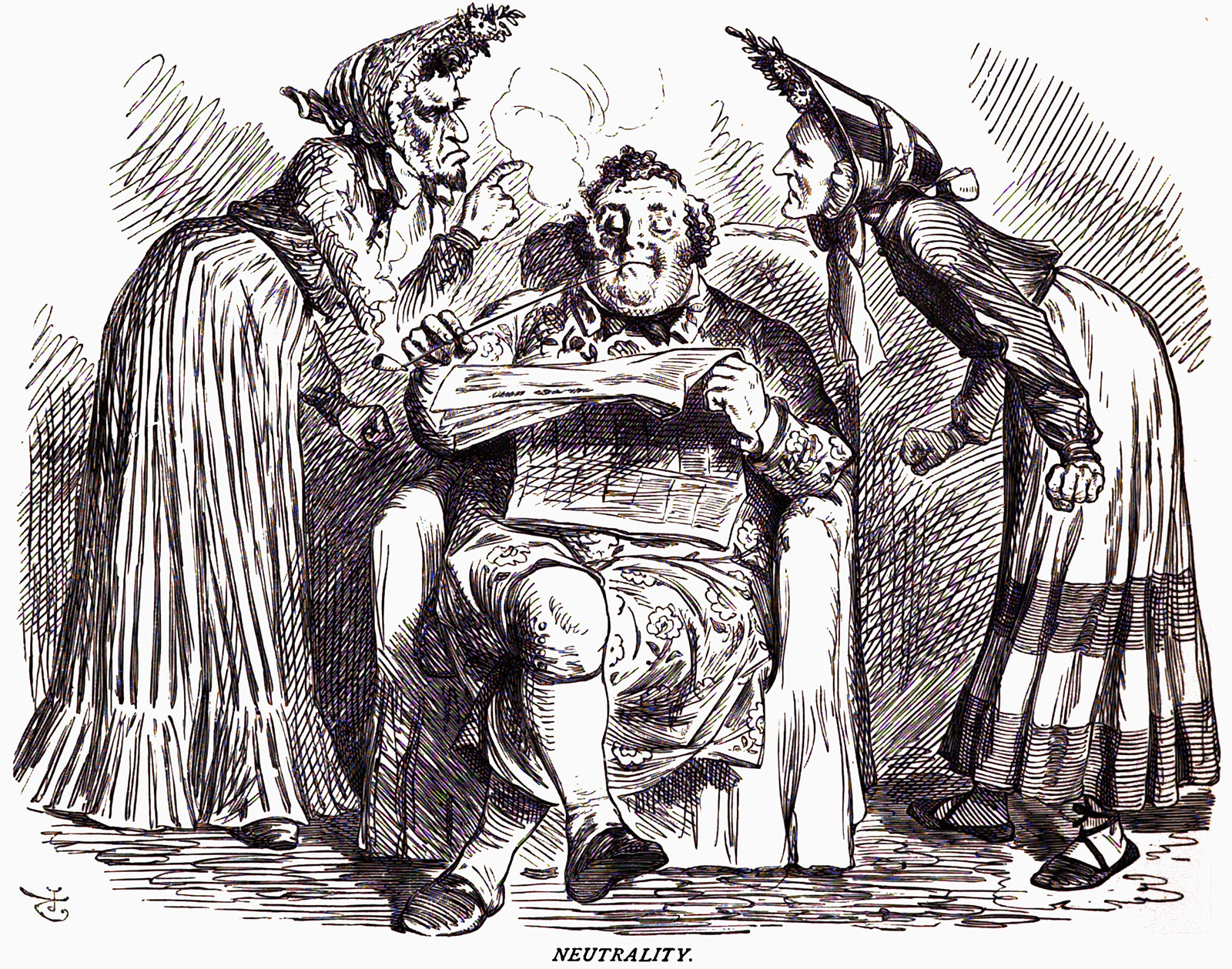“I could not answer for what might happen.” Part I
The Civil War was an intense international concern from the beginning. The neutrality—or lack thereof—by foreign powers was a decisive element in a conflict that might have spread beyond American shores. Both sides warred on enemy commerce; both American navies sailed into the vortex of a diplomatic maelstrom, and contributed to it. On the Union side, President Lincoln was determined to interdict trade with seceded states, starving them of funds, war materials, and necessities. It was proposed that he simply declare southern ports administratively closed, providing the navy an excuse to stop and turn back merchant vessels under the guise of enforcing customs duties not collectable in rebel-controlled harbors.
During a dinner at the British legation in March, 1861, Secretary of State Seward tested the waters with British Ambassador Lord Lyons, suggesting that warships would be stationed off the coast for this purpose. Lyons responded directly: “If the United States determined to stop by force so important a commerce as that of Great Britain with the cotton-growing States, I could not answer for what might happen…. An immense pressure would be put upon Her Majesty’s Government to use all the means in their power to open these ports.” All means included the world’s most powerful navy.[i]
The South had very little indigenous capability for ocean trade, relying heavily on Northern and foreign resources, and most of these were British now that Yankees were (supposedly) out of the business. British economics, industry, politics, and domestic stability were heavily invested in this commerce; obstructing passage of their merchant vessels in peacetime was an act of war against them. Lincoln could not strangle the rebellion this way. He could not even halt the import of weapons and military supplies—legitimate items of foreign trade—upon which Confederate armies depended.
In international law, a formal blockade could be recognized only when an official state of war existed, and wars were conducted between nations. But Lincoln insisted that the United States was not at war because the Confederacy was not a nation. Despite this glaring inconsistency, he saw no choice and declared blockade on 19 April 1861, one week after Fort Sumter.

The conflict was seen by the British as a serious threat to their interests. The possibility of a third conflict with former colonies became real and immediate. It had taken three hundred difficult years for Great Britain to establish a position of maritime supremacy; the entire structure of international law depended on her leadership. As a matter of example, rules of neutrality must be impartially enforced despite domestic politics pulling both north and south. On the other hand, they could not be so zealous as to establish precedents that would tie their hands in future conflicts.
Rules had evolved through many conflicts in treaties, legal decisions, domestic law, and common practice to protect trade of non-belligerents in wartime. They also were suitably ambiguous; effectiveness was grounded in mutual self-interest and bounded by what one could get away with. Neutrals in one war could be opponents in the next and no stand on an important issue could be acceptable to all parties.
Hundreds of British ships roamed the ocean; commerce was the life’s blood of the empire and the source of national wealth; its preservation was of paramount consideration. These were complex legal and diplomatic issues. So in May 1861, Queen Victoria officially proclaimed neutrality, formally recognizing the Confederacy as a belligerent in international law. France and other nations followed. The Confederacy had a constitution, a government, an army, a population of nine million people and effectively controlled 750,000 square miles of territory, clearly constituting a belligerent power under blockade.[ii]
Belligerents had three superior rights: the right to halt and inspect suspect ships of all nations on the high seas, the right to confiscate military supplies—contraband—intended for the enemy, and the right to blockade the enemy. Lincoln’s declaration of blockade provided legal justification for interrupting trade with the Confederacy. The British declaration extended protections of neutral status to their vessels, which could not be interfered with as long as they respected the blockade and did not carry contraband.[iii]
If a British captain was stopped and duly convicted through lengthy and complex court proceedings of violating these provisions, seizure was not contestable and the British government could not be held liable. Risk resided with ship owners, shippers and ship masters (many of whom were perfectly willing to take it considering the initial porousness of the blockade and the immense profits to be made).
Not appreciating the subtleties of international law and British sensibilities, Yankees were outraged and Southerners delighted that the Queen had taken what they interpreted as an important step toward recognizing the Confederacy as an independent nation. However incorrect they were in this conclusion, subsequent events convinced both sides that the British flagrantly violated neutrality in favor of the other, generating a great deal of rancor lasting long after 1865. There was no comfortable middle ground and a lot of room for disagreement; old and contentious controversies resurfaced concerning the rights and responsibilities of neutral powers.

The definition of contraband was restricted to items directly supporting armies. To be recognized, a blockade had to be physically implemented with warships on station and had to be considered effective at interdicting commerce. Both concepts were subject to interpretation. Confederates continuously insisted, with significant justification in the early years, that their enemy had not met these standards, and demanded that the British ignore or if necessary break the blockade, which would lead to war with the United States. Fearing that very eventuality, the British gave wide latitude to the blockade, continuing to respect it despite the shortcomings.
Ironically, the positions of the two governments were historically reversed. As the world’s leading maritime power and largest trader, the British tended to restrain the ocean commerce of other nations. They dealt harshly with neutrals—notably the United States—trading with their enemies, most recently during the French wars of revolution and empire. Americans on the other hand clung to the edge of their continent prospering on commerce.
Disagreements over customs duties had been a contributor to the Revolution. They fought hard for neutral trading rights during the Quasi War with France (1798-1800), and in 1812 declared war again with Great Britain largely on these issues. Now the tables were turned. The United States made every effort to impede trade with and minimize international support for the Confederacy while it became British policy to uphold neutral rights for unrestricted trade of non-contraband goods. (To be continued.)
[i] Dean B. Mahin, One War at a Time: The International Dimensions of the American Civil War (Washington, D.C.: Brassey’s, 1999), 45.
[ii] Frank J. Merli, Great Britain and The Confederate Navy, 1861-1865 (Bloomington: Indiana University Press, 2004), 40-41.
[iii] Donald A. Petrie, The Prize Game: Lawful Looting on the High Seas in the Days of Fighting Sail (Annapolis: Naval Institute Press, 1999), 162.
The real mistake made by the Confederacy during this period was their firing on Ft. Sumter. Had they not done so, public opinion in the north would have likely remained largely apathetic toward both secession and slavery.
I don’t see how they could afford not to fire on Fort Sumter following secession – or refrain from seizing other federal installations within the borders of the seceded states. It may have taken longer but secession was the real clash.
Dwight:
Very interesting Part I. Looking forward to future installments.
As I understand it, the Union’s naval blockage in the latter years of the war was pretty effective. But this was counterbalanced by the failure of the Lincoln administration – some say be design – to halt a thriving internal commerce between Southern cotton growers and Northern businessmen.